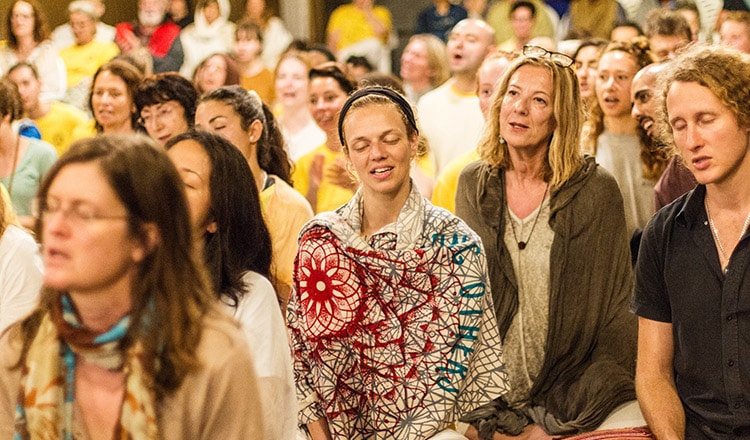Sivananda Bahamas Blog
Expand Your Horizons …
Our Blog
Chanting Ahimsa
by Nicole Vahlkamp (Nirmala)
It is 6 o'clock in the morning and 200 people are sitting cross-legged on a large wooden platform surrounded by palm trees made slightly iridescent by the contrast between the slowly rising sun and the shadows of the dissolving darkness. At the Sivananda Ashram Yoga Retreat in the Bahamas, Maya Tiwari, a renowned Ayurvedic teacher, is leading satsang the gathering of students to study and meditate on yogic teachings of truth.
Maya is teaching the group about ahimsa, what Swami Sivananda defined as non-violence in thought, word, and deed. Together, everyone repeats an ahimsa chant: I take the vow of ahimsa. I make inner harmony my first priority. I take the vow of ahimsa in my thoughts, speech, and actions.
The group is tentative at first, perhaps still too sleepy to chant with spirit, but Maya is encouraging. "Say it like you mean it," she urges. "Chant like Mike Jagger!" she insists, and soft laughter rustles throughout the crowd. Her jesting works. The group ahimsa chant gradually grows louder, shifting the energy to one of both subtle strength and peace.
My thoughts wander and I suddenly realize that, beyond my own vegetarian diet, I never think much about ahimsa even though I know it is one of the most important components of yoga. This chant adds another layer to my understanding, because the vow has a very clear instruction: Make inner harmony the first priority.
Maya speaks as the group continues to chant, telling us that ahimsa begins within the self, inner harmony is a prerequisite for greater non-injury, and ahimsa mantras can help us in our inner journeys towards love and kindness.
Of course, I know this to be true from personal experience. When I think of times when my words have been harsh, when I lose my patience with a colleague at work, scold my sister for leaving dirty dishes in the sink, or speak abruptly to someone I hardly even know, I see that my upset is rarely elicited by the other person. Instead, something else is making me angry, which I unfortunately take out on those around me.
Swami Sivananda understood the negative power of anger and its ultimate contribution to violence. In his writings on ahimsa, he taught, "All sinful and wrong actions are committed by you when you are under the sway of anger. Anger can be easily subdued by practicing non-violence. If anger is under your control you cannot do evil actions and you will enjoy supreme peace."
When we are angry, we can only spread anger; to spread peace, we must be internally peaceful.
But how do we cultivate such inward peace, kindness, and compassion?
Ahimsa mantras can guide us.
Whenever something disturbs us, we can use mantra to clear the mind, sweep away the negative thoughts and re-focus our energy on peace and love. In this way, we train the mind to calm itself when agitated, subdue anger, and avoid inflicting both internal and external harm.
Imagine if your co-worker upsets you, but instead of immediately lashing out, you repeated a mantra five times before responding? Or if the next time you start to be hard on yourself, even in a small way, such as thinking, "I should have gotten more work done today; I shouldn't have eaten that; I don't look good in this outfit," you instead began to repeat silently, "I make inner harmony my first priority."
I imagine all my interactions would be much different if I practiced this mantra daily.
As the sun rises, the group's chanting grows stronger, and so does my own voice. Eventually, my mind is focused only on repeating this vow, and I feel greater affirmation, self-confidence, compassion, and calm.
I can literally feel the power of the mantra in my body, and I understand Swami Sivananda and Maya Tiwari's teaching of truth: serenity within the self is the only path to true ahimsa.









One thought on “Chanting Ahimsa”
mafavi
wish you had some chance I could play on your website I could just put them on my iPad and play them at my leisure would love it
Richard bernstein
om aim saraswatyai namaha ,serve love give purify meditate realize be good do good be kind be compassionate adapt adjust accommodate bear insult bear injury highest sadhana highest yoga